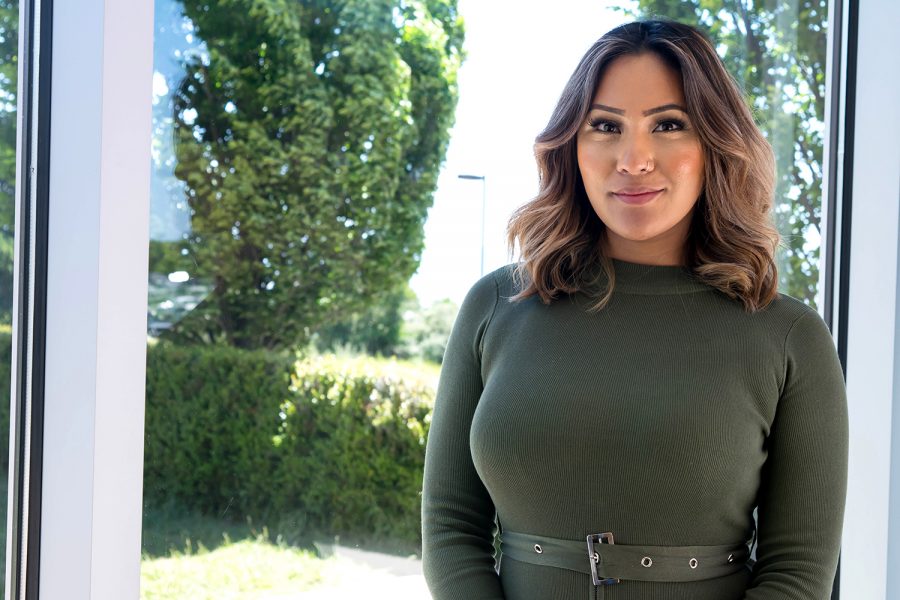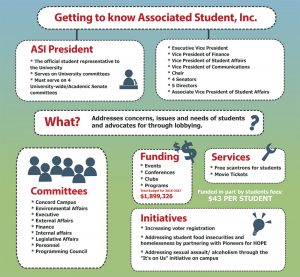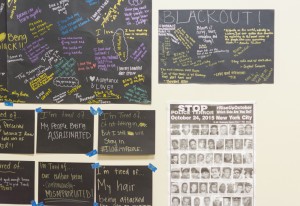Exclusive Q&A with Cal State East Bay’s ASI president
November 16, 2017
Samantha Quiambao is the 2017-18 President for Associated Students Inc. (ASI), the student government organization for the entire student body at Cal State East Bay. As soon as DACA was rescinded, she started an effort to involve the entire campus in a video project displaying the university-wide support for all those affected.
We wanted to take a look at what her focus is for now and for the future, as well as get to know some interesting facts about her:
Question: How old are you, where are you from and how does this contribute to you being the woman you are today?
Answer: I’m 22. I’m from San Leandro, California, which is like 15 mins from here. ASI has contributed a lot to who I am now, especially due to confidence and being able to be a woman of color who could voice her opinion on honestly anything on a platform that others don’t have.
What I’ve gotten out of it for my life is that I’m a lot more confident and I’m learning so much about different spectrums of life. I get to hear from DACA students, students of color who feel unrepresented and get to hear from other women who feel like they can’t be in leadership positions.
Q: What is your major?
A: Kinesiology with an option in therapeutic studies and a minor in biology.
Q: What do you intend to do after graduation?
After graduation I’ll be taking a year off, finishing prerequisites, taking the GRE [Graduate Record Exam] and applying to physical therapy school where I hope to get my DPT, Doctor of Physical Therapy.
Why did you want the job of ASI President?
A: Last year, I was executive vice president and chief of staff for ASI and I saw how moving it was to do the work. I knew I was taking on a fifth year so I also felt like my work wasn’t done.
This is my third year in ASI, this is my fourth position and I know the impact that we have on students not only on our campus, but honestly all over the state and all over the US, so that really drives me.
Q: What was the platform that you ran on to be elected and how will you or are you incorporating that platform?
A: My platform was unity, transparency, advocacy and accessibility for students.
The way I’ve been achieving [unity] is by uniting our students. There’s been hate speech on campus and I’m still uniting our students to stay away from those things; being involved in real talks on campus in the DISC [Diversity and Inclusion Student Center] and being involved in the harder subjects. I think that really has been creating some unity among our students.
Transparency; I pretty much post everything we do on social media. I post it on our website, on my personal social media and I send letters out to the campus. For example: my DACA letter I sent over the summer to students who need to renew and need to know our stance on it.
Accessibility; I’ve been working alot with Alex Baker in the Food Pantry, I’ve been working a lot with different departments on campus to make sure that things aren’t getting harder for our students and our students don’t have to go through a bunch of hoops to get their needs.
Q: What is your main focus and objective going forward for your presidency?
A: My main goal moving forward from this is really to continue our advocacy efforts. I think this is the first year where ASI has taken a lot of stances on different things. For example, we’ve written resolutions in support of different senate bills. We wrote a resolution in support of SB 16. We write resolutions in support or against things.
We were writing a resolution against the Title IX changes that they’re trying to have federally and I want to continue taking stances because I think it’s a very crazy political year and I want to make sure that our students understand that this is where we stand as a community and we are here for you.
Q: How do you implement holistic transparency throughout the Associated Students Inc?
A: Transparency to me is making sure students know everything that is going on regardless of it being internal or external. We do make sure that we table one hour a week where we meet with students and talk to them about literally anything. Everytime I table, I shake a hand and I like to know about what their major is, what they’re doing and/or if they have any questions for us, so we can get that answered or we can have their questions heard.
Our new website has everything down to archives from the ‘90s because we can put up our resolutions and our policies from back then. I personally ensure that the website is maintained so that all students, even if they are online students or commuter students who can’t physically see us, that they have a place to look at meeting minutes, resolutions passed, agendas, they know what time the meetings are, they know all the staff that works here. Our new website has all that information.
Q: What are some concrete initiatives or proposals that the student body can expect from ASI?
We always have our advocacy efforts and right now we’re working on what students can do to advocate for Title IX. A lot of people didn’t know that they’re pretty much trying to change Title IX so it’s not mandatory on every campus federally. We’re figuring out ways to advocate for that and still have programs like “It’s On Us” for our students to talk about sexual assault and talk about those harder topics like Title IX, harassment, racism, etc.
We’re also working on bringing more students to Sacramento when we lobby and advocate. In March, we have our big conference called CHESS [California Higher Education Student Summit]. We want to bring a lot more students with us to meet different assemblymen, meet different congressmen and meet different people in the actual capital to help fight for more funding into higher education, to fight for DACA students, to fight for Title IX advocacy, etc.
Some concrete initiatives students can expect are:
Continuing transparent advocacy whenever we meet with congressional leaders, we want to take more students at large with us to talk about the issues at EB.
Creating more opportunities for after college success – by hosting workshops, working with different entities on campus and helping students grow more professionally.
We will be working with local leadership in the city of Hayward to learn more about the policies in the city that can affect our students and introducing them to our students so they know who the local leaders in the city are.









